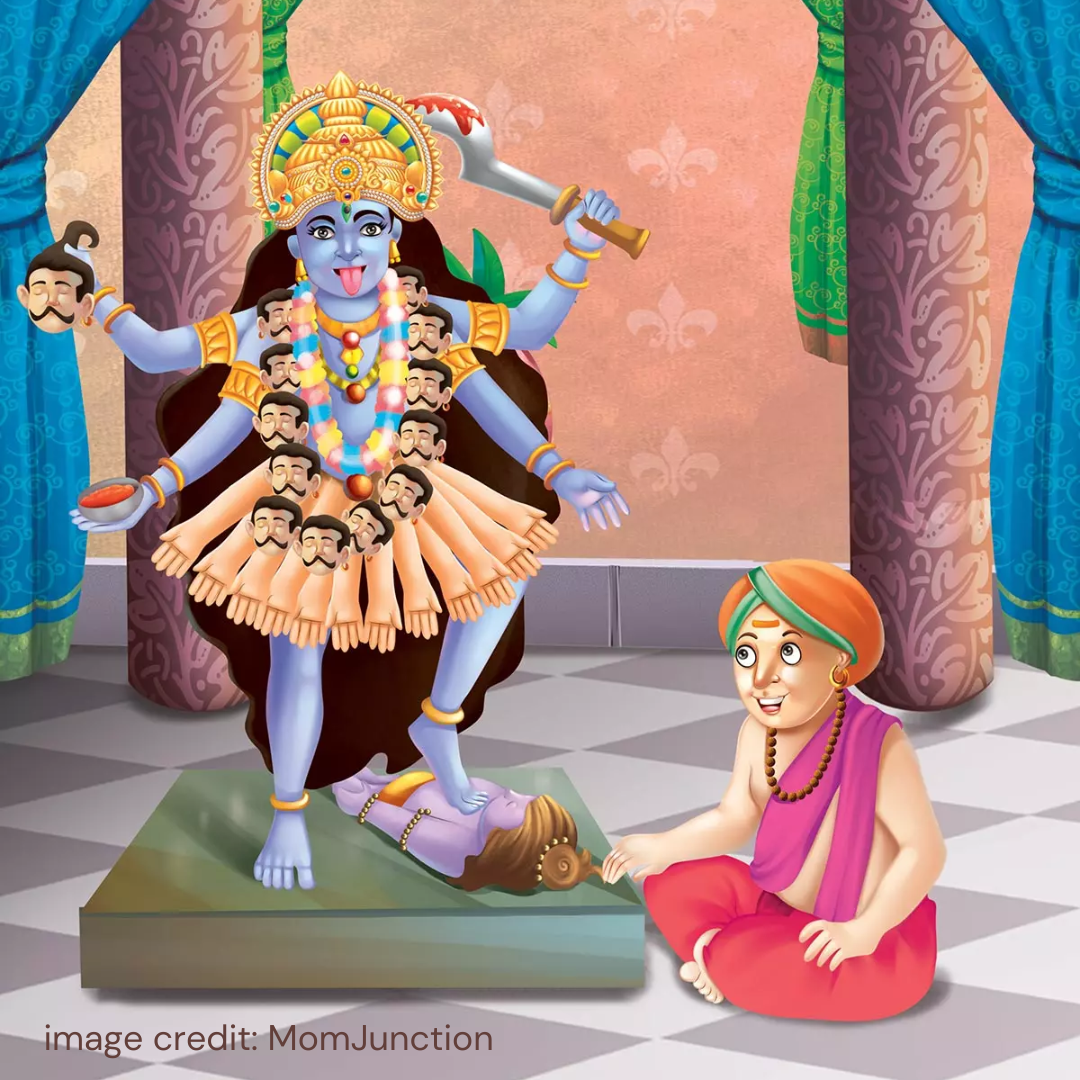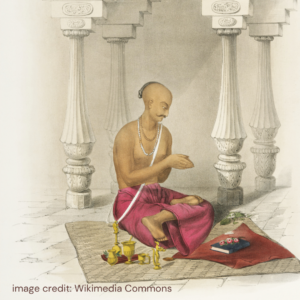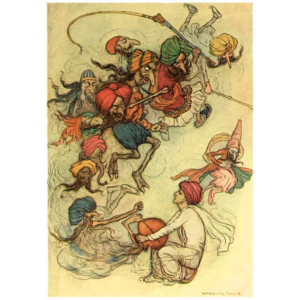The Brahmin’s Pot


The Brahmin’s Pot
By Rev. Lal Behari Day, Retold by Navin
 Once upon a time, there lived a poor Brahmin. He had no trade, and lived primarily on the donations of the wealthy. When he performed marriage or funeral ceremonies, he was able to make ends meet. However, the villagers did not get married or pass away every day, so the Brahmin and his wife suffered, and their children often went around hungry and barefoot.
Once upon a time, there lived a poor Brahmin. He had no trade, and lived primarily on the donations of the wealthy. When he performed marriage or funeral ceremonies, he was able to make ends meet. However, the villagers did not get married or pass away every day, so the Brahmin and his wife suffered, and their children often went around hungry and barefoot.
Though he had no worldly material, the Brahmin was a man of immense devotion. His favorite deity was the goddess Durga. He never drank water or tasted food till he had completed auspices and written Durga’s name in red ink one hundred and eight times. One day, the Brahmin, overwhelmed by grief, went to the edge of town and began to weep. “O Durga,” he cried, “Please grant me relief from my poverty! I would not mind it if I was alone, but I can’t bear to see my family suffer!” It so happened that on that very day, Durga was taking her morning walk in the skies of that area. She felt pity and floated down to see the Brahmin. “Here,” she said, “take this earthen pot. When you turn it over, endless milk sweets will flow from it. Your family can eat their fill, and you can also sell them.” The Brahmin was overjoyed and prostrated before Durga. She vanished in a shimmer of light.
The Brahmin joyfully began walking home. After he had walked for some time, he decided to try using the pot as soon as he returned home, eager to taste the heaven-made milk sweets. However, he had not yet completed his ablutions and prayer for the day. Seeing an inn by the road, and the innkeeper sitting outside, the Brahmin went up to him. He asked the innkeeper to watch his pot for him while he bathed in a neighboring pond. As the innkeeper watched the Brahmin bathe and write the name of Durga, he wondered why he was so concerned about a simple earthen pot. As he thoughtfully turned the pot over, he was shocked to see a stream of milk sweets start pouring out. He called his wife and children, who hurriedly filled all the vessels in the innkeeper’s home with the sweets. The innkeeper decided to keep the pot, and had his wife bring him an identical earthen pot. The Brahmin finished his prayer, took the pot not suspecting anything, and returned home.
When his poor wife heard his story, she thought her husband must finally have lost  his mind. Her opinion was confirmed when she turned the pot over again and again, only for nothing to fall out. The Brahmin was overwhelmed with grief and concluded that the innkeeper must have stolen his pot. The next day, he returned to the inn and asked for his pot back. The innkeeper pretended to be enraged, saying the Brahmin had some nerve, and proceeded to chase him from the inn. The Brahmin returned to the part of the forest where he met Durga and cried out to her. The goddess once again appeared before him. When she heard his story, she gave him another pot saying, “Take good care of this pot, and make good use of it.” The Brahmin made obeisance at her feet, took the pot, and started walking home. After a time, he turned over the pot to see if sweets would fall out. To his horror, a score of demons fell out of the pot and began to beat and kick the Brahmin. He had the presence of mind to turn the pot upright, at which point the demons disappeared. “She must have given me this pot for the innkeeper!” thought the Brahmin.
his mind. Her opinion was confirmed when she turned the pot over again and again, only for nothing to fall out. The Brahmin was overwhelmed with grief and concluded that the innkeeper must have stolen his pot. The next day, he returned to the inn and asked for his pot back. The innkeeper pretended to be enraged, saying the Brahmin had some nerve, and proceeded to chase him from the inn. The Brahmin returned to the part of the forest where he met Durga and cried out to her. The goddess once again appeared before him. When she heard his story, she gave him another pot saying, “Take good care of this pot, and make good use of it.” The Brahmin made obeisance at her feet, took the pot, and started walking home. After a time, he turned over the pot to see if sweets would fall out. To his horror, a score of demons fell out of the pot and began to beat and kick the Brahmin. He had the presence of mind to turn the pot upright, at which point the demons disappeared. “She must have given me this pot for the innkeeper!” thought the Brahmin.
 On the way home, he once again stopped at the inn, apologizing to the innkeeper for not trusting him, and asking him to watch his new pot. When the Brahmin had leisurely bathed and made his prayers, he walked back to the inn, from which were issuing screams and cries for mercy. The Brahmin entered the inn, and saw, as he had expected, a score of demons beating the innkeeper and his family. The innkeeper fell at the Brahmin’s feet asking for forgiveness, at which point the Brahmin turned the new pot upright, causing the demons to vanish. The innkeeper returned the sweets pot to him as well, and the Brahmin went home a happy man. His wife and children enjoyed the sweets heartily. The very next day, the Brahmin turned his house into a confectionary shop. His sweets became renowned all over the world, and his family lived happily ever after.
On the way home, he once again stopped at the inn, apologizing to the innkeeper for not trusting him, and asking him to watch his new pot. When the Brahmin had leisurely bathed and made his prayers, he walked back to the inn, from which were issuing screams and cries for mercy. The Brahmin entered the inn, and saw, as he had expected, a score of demons beating the innkeeper and his family. The innkeeper fell at the Brahmin’s feet asking for forgiveness, at which point the Brahmin turned the new pot upright, causing the demons to vanish. The innkeeper returned the sweets pot to him as well, and the Brahmin went home a happy man. His wife and children enjoyed the sweets heartily. The very next day, the Brahmin turned his house into a confectionary shop. His sweets became renowned all over the world, and his family lived happily ever after.
Moral: Take not what isn’t yours.








